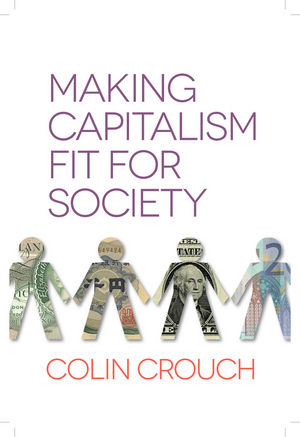Making Capitalism Fit For Society aims show that the acceptance of capitalism and the market does not require us to accept the full neoliberal agenda of unrestrained markets, insecurity in our working lives, and neglect of the environment and of public services. Outlining the principles for a more assertive social democracy, this book proposes that real possibilities exist to create a better world than that which is being offered by the wealthy elites who dominate our public and private lives. Colin Crouch offers another powerful contribution to the debate about the choices that we face, concludes Wyn Grant.
 Making Capitalism Fit For Society. Colin Crouch. Polity. September 2013.
Making Capitalism Fit For Society. Colin Crouch. Polity. September 2013.
In the latest of a series of books on our current dilemmas, Making Capitalism Fit for Society, Colin Crouch seeks to set out an assertive rather than a defensive version of social democracy. He offers a powerful critique of neoliberalism and in particular of the way in which growing inequality is not only morally questionable but also threatens the smooth functioning of the economy. Political neoliberalism is not about giving consumers more choices in competitive markets, but enhancing the power of great corporations and wealthy individuals. Rather than being about the application of some pure economic theory, but is really a political movement.
However, he is aware of the extent of the challenge that social democracy faces, not just because of the erosion of its traditional power bases. He accepts that ‘the social democratic vision requires some major adjustments if it is to assert its claim to be the alternative’ to neo-liberalism. His analysis is informed by a crucial distinction between three types of neoliberalism. The first of these is the pure type in which a strong state has a limited role in guaranteeing the operation of markets. Another version is neoliberalism as it exists ‘which refers to the amalgam of corporate lobbying of governments and the deployment of corporate and other private wealth in politics’.
The version that is most relevant to Crouch’s argument is those who ‘while accepting the value and priority of markets in the economy, are aware of their limitations and deficiencies.’ This approach is encapsulated in the old German SPD slogan, ‘as much market as possible, as much state as necessary’, although as Crouch points out this neat formula begs the question ‘when and why does the state become necessary?’ Nevertheless, he admits that both social democrats and conservatives could sign up to this formulation. What he identifies as fundamental goals for social democrats such as ‘the need for all people to enjoy a decent life, even if they cannot be very successful in the market’ and ‘the need for human beings to be able to manage successfully certain shared, collective tasks’ could be shared by a German Christian Democrat.
Perhaps a difference is to be found in Crouch’s argument that ‘social democracy’s core role [is] as the political movement that represents the lower part of society’s distribution of income and wealth.’ He sees assertive social democracy at work ‘in a small but important part of the world, north-western Europe.’ Denmark is singled out for praise as ‘an example of a society with a strong labour movement and social democratic record, and a low level of inequality.’
But is it sufficient to say ‘We should all be Danish now’? Of course, there is more to Crouch’s argument than this, in particular an advocacy of a coordinated market economy version of capitalism. Social democratic governments could well be elected in the future, not least because neo-liberal policies can particularly adversely affect women both at work and in the home. Crouch argues that we can make political choices and do not have to passively accept neoliberal orthodoxy. However, it is difficult to persuade people to accept the possibility of constructive political solutions at a time of at least indifference, and at worst hostility, towards the political process. The social democratic promise is that democratic politics can make a positive difference to people’s lives, but if people doubt that possibility, the social democratic project is undermined.
Crouch is aware that his earlier books, Post-Democracy and The Strange Death of Neoliberalism were criticized for being strong on analysis and short on solutions. He notes, ‘Many readers and reviewers have criticized me for offering little more than participation in citizens’ initiatives, consumer movements and conscientious professional organizations with which to confront economic power.’ He is aware of just how powerful corporate business interests can be, citing the impressive recent analysis by Stephen Wilks, The Political Power of the Business Corporation.
New Labour policies have been portrayed as a compromise between neo-liberalism and social democracy. Crouch thinks that the Third Way and the Neu Mitte performed a valuable function in drawing attention to the exhaustion and impossibility of the old socialist project, but thinks that their ‘error was to go beyond accepting capitalism and to accept it uncritically – in particular not seeing any problem in the accumulation of corporate power, especially in the global economy.’
Crouch sets out a ‘feasible prospectus’ which involves re-examining the role of the Anglo-American shareholding firm and regulating and offsetting the effects of markets, although rather puzzlingly he sees the regulatory state as a neoliberal construct. The prospectus is sensible but not especially novel. Crouch has, nevertheless, offered another powerful contribution to the debate about the choices that we face.
——————————————-
Wyn Grant is a part-time professor in the Department Politics and International Studies at the University of Warwick. He has worked closely on research projects with colleagues in the Department of Life Sciences and teaches there and at the Warwick Crops Centre, Wellesbourne. In 2010 he was presented with the Diamond Jubilee Lifetime Achievement award of the Political Studies Association of the UK at their Awards Ceremony. He was elected an Academician of the Academy of Social Sciences in 2011. His most recent book is (co-edited with Graham Wilson) The Consequences of the Global Financial Crisis: the Rhetoric of Reform and Regulation . Read more reviews by Wyn.








